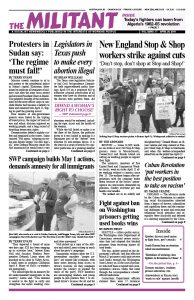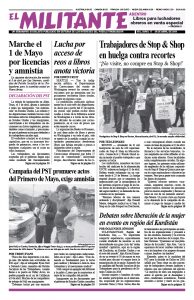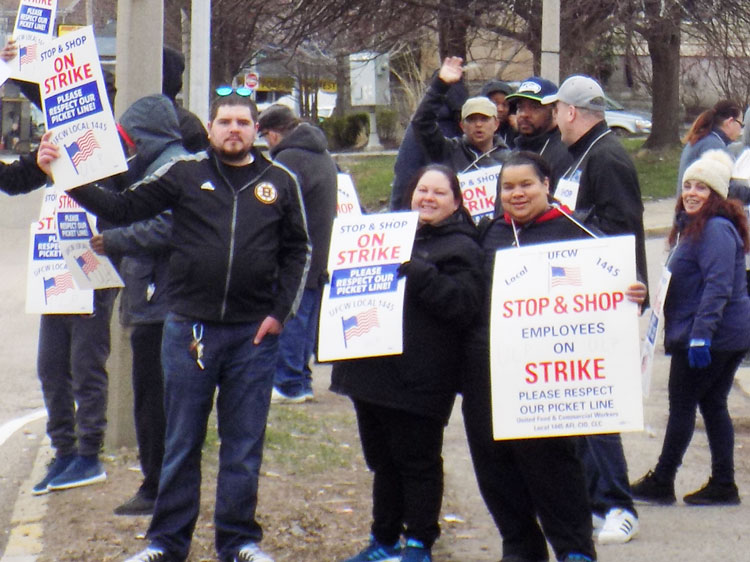BOSTON — Some 31,000 workers on strike at over 240 Stop & Shop grocery stores in Massachusetts, Connecticut and Rhode Island are calling on working people to support their fight.
The unionists, members of five United Food and Commercial Workers locals, went on strike April 11 after working without a contract since Feb. 23. The walkout began after negotiations with the company broke down because of the bosses’ intransigence on concessions demanded on pensions, Sunday overtime pay and health care benefits.
“We walked out in an orderly and disciplined way,” Donald Moore, an 18-year veteran and shop steward at Freeport Street Stop & Shop in Dorchester, said when this worker-correspondent joined him on the picket line April 12.
At most locations the pharmacy and banking services, which aren’t union organized, are open. Other stores are completely shut down. In some locations the bosses are using employees from Stop & Shop corporate headquarters in Quincy to ring cash registers and stock shelves. The company has also been putting in more self-checkout stations. But few people are crossing the picket lines.
I also visited picket lines April 12 at the store at South Bay Center here, which was open, and at the one on Freeport Street, which was closed.
“They want to cut our vacation time, increase our costs for health insurance, eliminate pensions for new hires, and give us a bonus instead of a wage increase,” said Moore. A key disputed point is the company’s demand to eliminate Sunday time and a half for part-time workers, a bid to sow division among full- and part-timers.
“They have one person doing the job of two or three in there,” Jeff Jean-Louis, one of 40 workers picketing at Freeport Street, told the Militant.
“I’m supporting the strike,” Steve Rosen, a regular customer at the East New Haven, Connecticut, store told the press when he came by the picket line. “I live with those folks, they live with me in the same town. We share common goals. I’d love to see them get ahead.”
The company claimed in a statement that its final offer “is better than most recent UFCW contract settlements and responsive to heavy non-union competition, the unions proposed a contract that would increase the company’s costs. This would make our company less competitive in the mostly non-union New England food retail marketplace.”
Picketing at the Pittsfield, Massachusetts, store, overnight stocker Steve Jackson said, “The owners say they can’t compete with nonunion stores. I say why not organize all the grocery store workers into the union? The unions have to be willing to break into those other grocery store chains.”
While Militant correspondents were on the picket line there, Papa Gino’s workers came by with four pizzas to give the strikers. And a family came by with donuts and coffee as passing drivers honked their horns in solidarity.
“Stop & Shop’s demands came as a shock to us because the company has been so profitable,” striker Tina Kokoska at the picket line in Windsor, Connecticut, told the Militant. “We’re not asking for more. We just don’t want what we have taken away.”
One boss demand that makes strikers angry and determined is to nearly double the money workers would have to pay for their health insurance. By March 2021, workers would have to shell out $38 a week for family coverage.
Netherlands-based Ahold Delhaize, which owns Stop & Shop as well as the Hannaford and Food Lion chains, reported $2.1 billion in profits in 2018.
“While Stop & Shop continues to propose drastically cutting workers’ benefits,” UFCW Local 1445 said in a statement, “Ahold shareholders voted on April 10 to give themselves an 11.1 percent raise in dividends over last year. The expected payout will be on April 25 for around $880 million.”
Jacob Perasso in Pittsfield, Massachusetts, and Tim and Leslie Craine in Windsor, Connecticut, contributed to this article.


